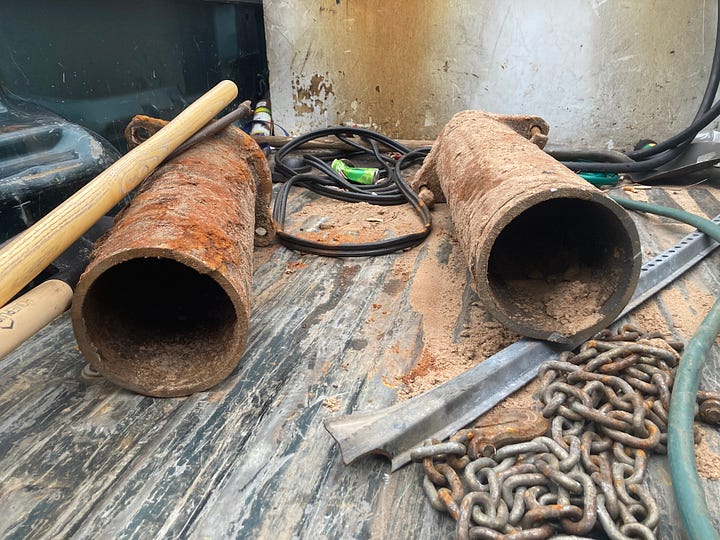
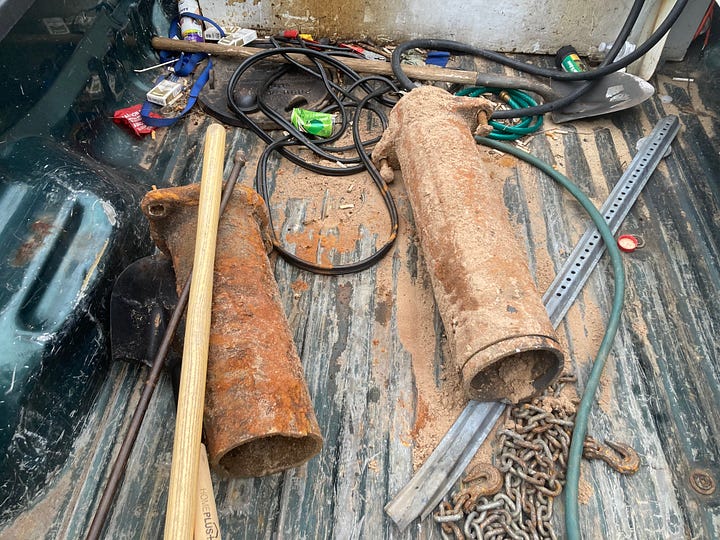
After two years of complicated effort by our Village president Jennifer Wilkins, office staff, DPW, and our main engineer, Ken Mlcek, to secure and budget for USDA and DWSRF grants, hold public hearings, pass resolutions, and gather permission from property owners this past spring, our huge, $5.3 million water main and lead-line replacement project is about to get underway. Subject to materials availability, weather, personnel issues, equipment failure, and other contingencies predictable and not, this phase of the project is expected to be complete at the end of November.
Jen Wilkins has already begun receiving tons of emails and visits to the office from residents concerned about when and how the project will directly affect them, so this Alert is an effort to give everyone a better idea. Please share it widely! It’s free. Read on …
How Disruptive Will This Be?
Unfortunately, due to the nature of the project, it’s impossible to say exactly when workers will reach any particular street or residence. Construction on the water main replacement will begin as soon as late July or early August. The plan is to first replace the water main in a section and then the leads into houses and businesses on that main. Residents and business owners will be getting a heads-up from the Village or Elmer’s prior to construction in their area. Plus you’ll start to see activity on your street.
As of today, the starting point is Steele Street, Cartwright Street, Grant Street, and Lincoln Avenue. Per our contract with Elmer’s, traffic control will be handled by them, and everything that is dug up during construction will be replaced. Ken Mlcek said, when I asked him, that there are a couple of trees that will have to come out, but effort will be made to avoid removing trees.
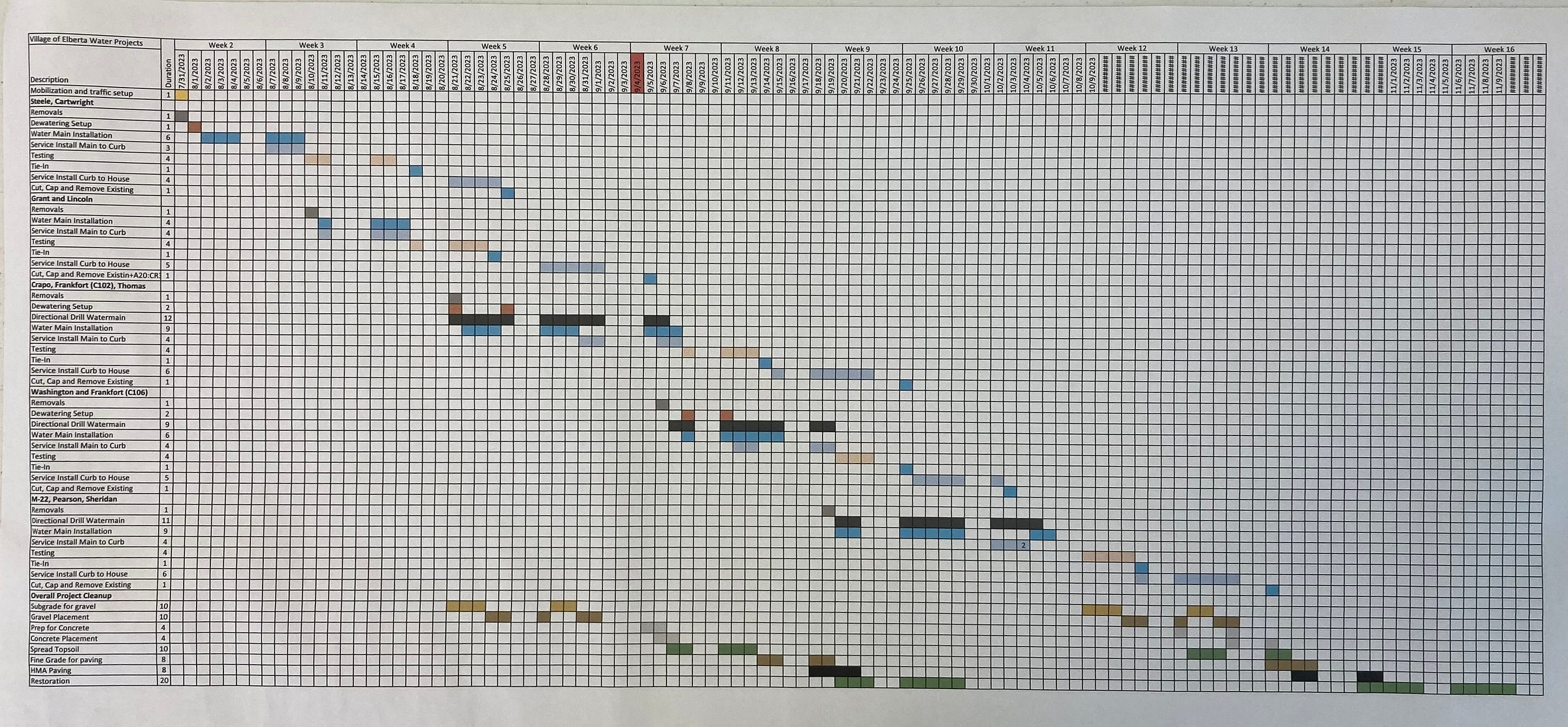
Will My Water Be Shut Off?
If and when the line replacement work comes to you (look on the map; you may not be on it!), water service shutoffs will be minimized. Mlcek says it’s typical to experience a water service shutoff up to two times when a water main is constructed in your area. These interruptions are necessary to connect the new water main to the existing water distribution system, and also to connect your new water service line to the existing piping on your property or in your house. The duration of these water service interruptions can range from a couple of hours to a full workday, but water service will be restored by the end of each day of interruption. Multiday continuous water interruptions will not occur, Mlcek says. In the event that your water is shut off, it’s a good idea to run the water from each tap in your house for about 1 minute when water service is restored, to flush the piping in your home and clear any air that remains in the piping after the connection is completed, Mlcek says.
There is one exception to the water shutoff process described above: if a water main or water service break occurs. A break is an emergency situation, and there will not be time to notify residents of a water shutoff. The water will be shut off as quickly as possible. (It will be like what happened in February, which happened because our pipes are hugely old and rusty, and because these repairs we’re finally starting now should probably have happened decades ago [my opinion]. Anyway, we’re doing it now.) Mlcek says the Village and Elmer’s will pay close attention while digging to minimize the likelihood of damaging the existing (old) water piping, but these events sometimes occur. If a break occurs and it results in an unplanned interruption of your water service, please be understanding.
Again, residents and business owners will know somewhat ahead of time when work comes to them, because they will need to allow Elmer’s access to hook up the line inside the house or business (this was the permission you granted in the spring, if you did). Wilkins, DPW, and Elmer’s are doing their best to pick days that will be the least disruptive for businesses. For example, because the Cabbage Shed is closed on Sundays and Mondays, Elmer’s was told those two days would be best to run the new line into the business. Some people might be more inconvenienced than others. But that’s life, isn’t it? Personally, I’m very bummed out that my lead pipes will not be replaced this time.
Will My Lead Lines Be Replaced?
Everyone who has lead lines will have them replaced … eventually. It’s an EGLE regulation and the Village must comply. By the time the bids were opened, back on May 12, costs had risen so much that the scope of work had to be narrowed significantly. Remember, we’re paying for this mostly with grants. Another round or two of grant seeking and bid taking and meetings will be required to get the whole job done in the coming years.
If your property is within the project area shown in the figures included here, the water service to your property may be replaced if the existing piping consists of materials that violate EGLE lead and copper rules. Elmer’s won’t be replacing water service lines to properties that do not have water service materials that violate the rules; for example, if they find copper water service pipe on a property and it goes all the way into the house, we will not be replacing this service — there is no violation.
USDA Will Be Watching Closely
At the preconstruction meeting July 12, representatives from the USDA, our funder, discussed safety and reporting requirements, chain of command, materials testing, and water tests; USDA will be updated monthly by our engineer. Any change in the scope of work or work stoppage has to be reported to them immediately.
New Pipes
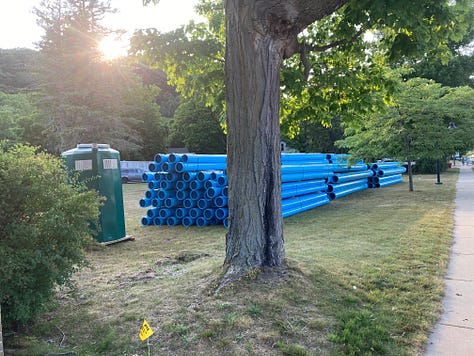
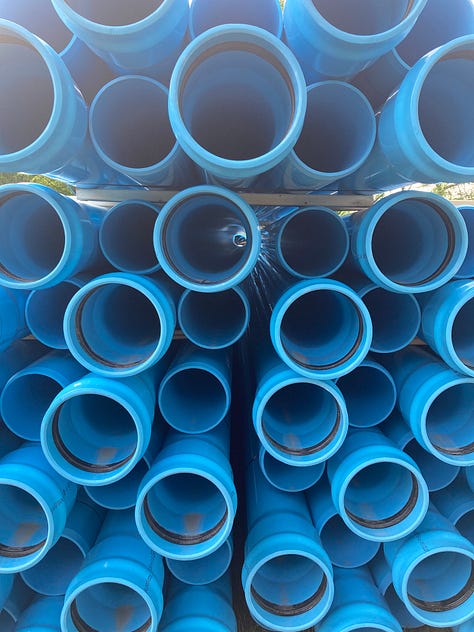
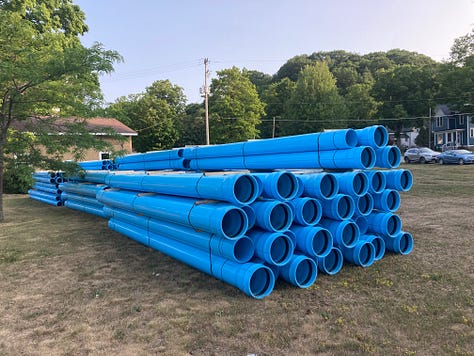
Stay Informed Right Here and on the Village Website
I’ll be posting updates through the Alert and on the Village’s homepage; more detailed information on the project’s progress can be had in official meeting minutes, and meeting recordings and reports posted here. Consider actually attending a meeting! And feel free to call the Village office or DPW with other questions or concerns. Talk to your neighbors and try to help spread accurate information, because we don’t have the staff for a 24/7 hotline to answer questions that have already been answered elsewhere. You can also post questions or comments below, and I will try to find out the answers.
After attending the preconstruction meeting July 12, I feel confident that we’re in good hands, with professional and knowledgeable contractors and the oversight of our engineering firm Fleis & Vandenbrink and the USDA. Let’s hope everything goes roughly according to their very detailed plans, and we can look forward to a future with a cleaner, safer water system that will serve us well as we build a better Elberta.





